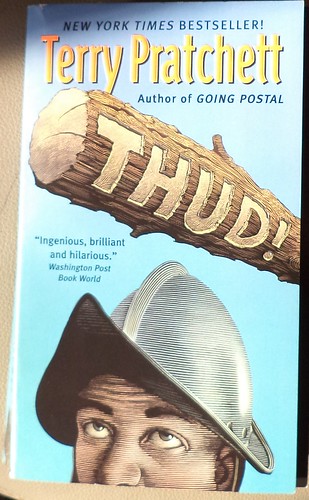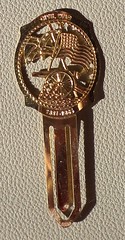I suppose having a heavy cold is good for one thing. I finished another book on the way to reading twelve this year.
This is another in Pratchett's hugely popular Discworld series. Unlike previous books, you do not need to know the back story of any of the characters to enjoy this novel. This is science fantasy, at least that's where you'll find it. But it's very much a satire and you need to understand that Pratchett skewers everything in his Discworld novels. His British humor (humour?) is very much in evidence but it's not as pronounced as I've seen in other books. I should have counted how many of the series I've read, but I didn't. (When I think of getting rid of some of the books in this house, Discworld books are not even considered.) Come with no preconceived notions of what the book will skewer and enjoy the ride.
So what is this book about. The cheeky answer is, "It's about 300 pages". That's not quite double the size of usual Discworld novels. They tend to hover between 160-180 pages, which is, in paperback size, about a half inch thick. This is a good inch and a quarter thick and even if I lop off the advertising at the end, it's still close to an inch and a quarter.
It's also not as "ha ha" funny as other novels. Oh it's got some priceless moments, but this is a more sober novel, more a twists and turns novel, more a "what's going to happen next" novel. It's a murder mystery, a who-done-it where the "obvious" murderer is obviously not who did it. I can see that. The head of the police (called "The Watch" in the book) can see that. The head of the city where this takes place can see that. But the deceased was the leader of the dwarves and the seeming murderer was a member of their arch enemy, the trolls. Throw in that the murder takes place before the anniversary of the epic battle between trolls and dwarves, one which happened thousands of years ago but is still celebrated. And that battle has, for hundreds of years been a subject of debate about who attacked whom first and, more importantly, who won. The chief of police needs to solve this one, stat, and keep the two sides who really, really, really, don't like each other, from reenacting the battle in the capital city.
There are side plots galore. Discworld books are, to me, like hearty stews. Every person introduced, and some don't show up until you're 2/3rd of the way through the book, every plot twist (Wait a minute. She's a what?) are like additions to the stew. This guy simply dies of fright, of the possibility that he could be taken by the Summoning Dark. The chief of police reads "Where's My Cow?" to his young son every night at 6 without fail and it was hugely amusing to see how much a made up first book which included animal sounds could influence the ending of the novel. (Terry Pratchett actually followed up this book with "Where's My Cow". Looks like I have to get that to have my Discworld collection complete.)
What struck me about the book, however, was how Pratchett used it to comment on the nature of perception, especially when it comes to historical events. There is the aphorism, "History is written by the winners", but what if there weren't winners? What if we took an epic battle, one we know "everything" there is to know about it and discovered it wasn't exactly like we've come to understand all these years? What if the "history" that we know is colored by which side we happen to be on?
I have a lot of bookmarks. They are all in a pile on the desk in the bedroom. I change bookmarks with every book. I just reach into the pile and whichever one feels good, that's the one I use. The bookmark I used for Thud is a Civil War commemorative. One hundred and fifty years later, we are still wrestling with the issues of that war, a war that is greatly colored by which side you happen to fall on, which view you happen to hold. Pratchett's own English history is filled with great moments of he said he said versus Wales and Scotland and Ireland.
Look across the ocean to Europe and the Mediterranean. Wars have been fought for far less than states rights. In some cases, no one knows the exact reason Joe hates Fred, but they only know they are supposed to because the dwarves and the trolls had an epic battle in this very spot some 4,000 years ago and you dwarves started it. No we didn't. We just came here for the restorative waters and a band of trolls jumped us. Well, I won't give away what the police chief found but it wasn't what "everyone" suspected.
I find the nature of the satirical novel, and Pratchett slathers this on with a trowel so if you don't like satire, don't read Discworld, to be the closest to holding up a mirror to ourselves. I think the huge popularity of Pratchett's novels and he's written far more than just those in the Discworld series, including children's books that are not satirical, hinges on his ability to take what we see every day, and make us think about what it is. He's skewered politics (well, that usually happens when the book is set in the main city), the post office, the movie industry, religion, academia, science fiction, the nature of fame, expectations, you name it, it's probably been poked at. Sometimes, satirists want to change the world. They want you to take down your preconceived notions you've always been told. Most of the time, they just want you to look at things with different eyes or from a different view.
We can't not see something from our point of view as a dwarf, troll, vampire, werewolf, human, ogre, etc. (You tell me what Nobby is.), but we can, for a moment look at our own history with a "what if". What if the Gathering Dark is not allowed to gather, but is rather told to get out of town, could we turn an event where we'd normally recreate a battle into celebrating a commonality between us? Would we then find ourselves reading more "Where's My Cow" to 6 month olds than bashing in peoples heads with clubs?
Beverage: Cranberry Raspberry seltzer
Deb


No comments:
Post a Comment